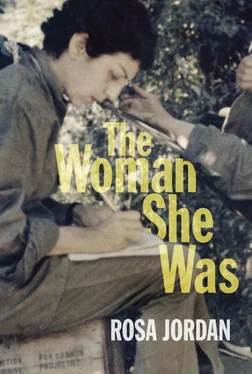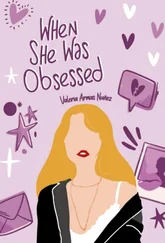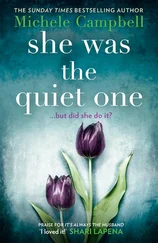Franci nodded sagely. “It’s a gender thing. And an experience thing. Bombs would have made the men feel helpless. The aftermath, bloody as it was, would have made nurses like your mom feel competent, even powerful.”
“I suppose so. Anyway, because of that I always associated her with the Oriente and never thought much about the month she spent at La Comandancia.”
“So how was it?”
“Good. On the walk up I met a man who was there at the same time, although he was just a child and didn’t remember her.”
Celia paused and deliberately directed Franci’s attention away from the Comandancia. “Do you remember her, Franci?”
“Sure! Not that kids take much notice of their friends’ parents. But later, when we were in college. Remember the time we took the train to visit her in the hospice?”
“I still feel guilty that I didn’t spend more time with her at the end.” Celia continued, scratching the mosquito bite until it bled.
“Stop scratching,” Franci commanded. “I’ve told you before you must not feel guilty about that. I have counselled terminal patients. Some are depressed, some are angry, some are resigned. But all say the most difficult part of dying is watching the anguish of people they love. It only adds to their suffering.”
When Celia did not respond, Franci continued. “Your mother could have spent her last year in a Habana hospital. Or at home, for that matter. She was the one who asked to be sent to a hospice in the country.”
Celia nodded. “She loved horses. She said she wanted to be where she could look out the window and see them anytime.”
“So that old hacienda was perfect. I don’t think the government could have found a better use for it. I liked the way they let horses graze on lawn.”
Celia smiled. “She used to ask for extra sugar, not in her coffee but on the side. She fed it to the horses out the window.”
“It was perfect,” Franci repeated. “Close enough to Habana that she could call you and Carolina when she felt well enough, but far enough away that you couldn’t visit every day and she didn’t have to watch you watching her deteriorate.”
“I suppose,” Celia sighed. “That last visit, remember how we sat on the end of her bed and massaged her feet?”
“And she started telling us about a lover who used to massage her feet. Oh yeah, I definitely remember that!”
“And that got her talking about all the lovers she had had since my father died.”
“Ay! The look on your face!” Franci chuckled. “You didn’t have a clue.”
Celia shook her head. “I told Carolina later, and she was as astounded as I was. Old compañeros from the war were always dropping by, often staying overnight, before and after my father’s death. Even after she got sick. It never crossed my mind that some of them had been her lovers. Although I should have figured it out. She lived fourteen years after Papá passed away. That is a very long time to sleep alone.”
“She was in good form that day,” Franci smiled. “I remember her saying, ‘Men are like horses. They are bigger than you and stronger than you and you can’t make them do anything. You can only make them want to.’”
Celia giggled. “The man-horse advice I remember was, ‘Never trust a horse or a man until you have observed the beast long enough to understand its basic nature. Not just in tranquil times but how it behaves when it is thwarted or frightened.’”
“Gosh, yes!” Franci exclaimed. “What did we know about horses?”
“What did we know about men ?” Celia shot back. “I never told her I was involved with José, but I think she knew. Not from anything she said then, but later.” Celia gazed pensively into the past. “I sneaked back after visiting hours, to be alone with her.”
“I know. I woke up and you weren’t there and I knew you’d gone to her room.”
“I climbed in the window. She was already awake. As soon as I threw my leg over the sill, she whispered, ‘Quick, Celia, so they don’t catch us!’”
Celia drew her knees up and rested her chin on them. “I crawled into bed with her and we just held each other for a long time. I told her what a good mother she had been.”
“What a gift,” Franci sighed. “That must have meant everything to her.”
Celia turned her gaze to Franci. “What she said was, ‘I never worried too much about being a good mother or a good wife or a good nurse or a good revolutionary. But I have tried to be a good person.’ I asked how I could be a good person too. She said, ‘Think hard about what matters most to you. When you think you know what it is, do it. Or defend it. Be strong . Don’t let other people decide for you.’”
There was a long silence. Then Franci said, “Is that why you didn’t drop out of med school and go to the States with José?”
“That jerk!” Celia exclaimed, surprised that after such a long time her anger could flare so hotly. “Remember how he burst into our room yelling, ‘Let’s go, girl! Sunday morning we’re off this goddamned island for good!’ Did he really think I would throw away four years in medical school just like that?” She snapped her fingers.
Franci laughed. “I remember you started beating him in the face with a rolled-up term paper that you’d spent about twenty hours typing. And when he backed out and was trying to shield himself behind the door but leave it open enough to talk to you, you threw everything in the apartment at him.” Franci got up and went to a bookcase in the corner of the room that held, among other things, old textbooks. She picked one ragged volume and held it up. “You know what book this is?”
“How can I tell? It has no cover.”
“It has no cover because you threw it at José Lago and broke the spine.”
“I never knew that!” Celia exclaimed. “If you had told me, I would have—”
Franci shook her head. “You were in bad shape, hermana. When José walked out on you, a ripped-up textbook was the least of your problems.” She put the book back on the shelf and turned to Celia. “And now he’s here again. What are you going to do?”
Celia shrugged. “José Lago is not my problem anymore.”
Franci gave her a suspicious look. Belatedly, Celia remembered that José’s return was the excuse she had given for needing some alone time, and backtracked. “I did need time to think about it. Mostly about Luis. José being here is harder on him than on me.”
“You could marry Luis.” Franci picked up a hairbrush and began fluffing her Afro. “Not that I’m suggesting—”
“Then don’t,” Celia said tightly.
“So José being back has changed things.”
“No! But, well—” Celia took a deep breath. “José aside, I doubt that I am ever going to be ready to marry Luis. If I could find a kind way of breaking it off with him—”
“Get real, Celia. There’s no ‘kind’ way to dump a guy. Especially if the dump coincides with the appearance of an ex-lover.”
“I know that,” Celia said sulkily, the sulk apparently being part of the regression into adolescent mode.
“I can’t believe you’d be such a knucklehead as to take José back after—!”
“Hey! You’re a certified shrink!” Celia shrieked. “You are supposed to listen attentively and act sympathetic, not call your patient a knucklehead!”
“You are a knucklehead if you—”
“Honestly, Franci, what do you take me for?”
“Uh… a woman who hasn’t got her feelings sorted out?”
“About José I do. He is the same manipulative macho he was back then.”
“But sexy?” Franci probed wickedly.
“Okay. Sexy. But for your information, I am not sex-starved. Just because he has a permanent hard-on—”
Читать дальше












